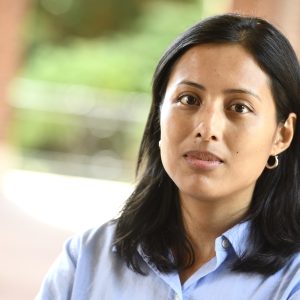Climate Solutions
Climate change poses one of, if not the, most pressing threats to this and future generations. It is a wicked problem that demands immediate, collective action not just from climate scientists and policymakers, but from individuals across all disciplines. Johns Hopkins is dedicated to leveraging its world-class faculty, resources, and influence to develop and implement solutions to the climate problem.-

Elizabeth Reilly
Senior Staff ScientistElizabeth P. Reilly, PhD, focuses on graph theoretic analysis of intelligent systems. Her recent work includes studying the brain to revolutionize the future of computing, developing theory for understanding and effecting emergent behavior in complex networks, and modeling the complex relationship between food security and civil conflict. -

Brian Schwartz
ProfessorBrian Schwartz, MD, MS, GME ’90, uses environmental epidemiology to evaluate the drivers of sustainability health impacts, such as energy, agriculture, and built environments -

Shilva Shrestha
Assistant ProfessorDr. Shilva Shrestha focuses on developing sustainable anaerobic biotechnologies for waste treatment and resource recovery of biofuels and biochemicals. Dr. Shrestha’s lab also studies microorganisms with industrial and environmental applications. -

Jennifer Sleeman
Senior AI Research ScientistJennifer Sleeman, PhD, specializes in Machine Learning, Deep Learning, Generative models, Image Processing and Natural Language Processing. She is currently working at the intersection of AI and climate tipping point discovery as part of the DARPA AI-assisted Climate Tipping-point Modeling program; the team is using large ocean circulation models, deep learning, and neuro-symbolic representations to build a general machinery that is able to predict conditions that may lead to a collapse of the Atlantic Meridional Overturning Circulation and other types of climate tipping points, such as coral reef die-off. She is also leading the research for a set of AI for air quality forecasting projects that include collaborations with NASA and NOAA, including: AI Emulation of Wildfire Emissions, AI Air Quality Forecast Model Emulation, and a Next-Generation Ensemble Prediction System for Atmospheric Composition. -

William Swartz
Associate ProfessorWilliam Swartz, PhD, is a research scientist studying atmospheric chemistry and physics, with broad research experience in modeling/analysis, technology development, space mission development, field measurement, and laboratory experimentation. -

Darryn Waugh
ProfessorDarryn Waugh, PhD, studies large-scale atmosphere and oceanic flow and transport, with a focus on understanding global environmental issues such as stratospheric ozone depletion, climate change, and air quality. In recent years his interests have expanded to include urban climate and environmental justice
If you would like to be added to the directory, please email [email protected].